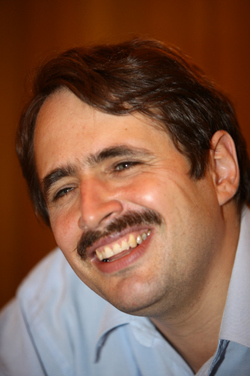еӣҪеӨ–йҹ“еӣҪеӯҰеӯҰиҖ…гҒҹгҒЎгҖҒгғһгғғгӮ«гғјгӮ·гӮәгғ жҶӮж…®

гҖҖгҒ„гӮҸгӮҶгӮӢвҖҳгӮӨгғ»гӮҪгӮҜгӮӯдәӢ件вҖҷгӮ’еҘ‘ж©ҹгҒ«еӨ§гҖ…зҡ„гҒӘвҖҳеҫ“еҢ—зӢ©гӮҠвҖҷгҒҢеәғгҒҢгӮӢгҒӢгӮӮзҹҘгӮҢгҒӘгҒ„гҒЁгҒ„гҒҶжҶӮж…®гҒҢй«ҳгҒҫгӮӢдёӯгҖҒеӣҪеӨ–гҒ«гҒ„гӮӢйҹ“еӣҪеӯҰз ”з©¶иҖ…гҒҹгҒЎгҒҢеӣҪ家жғ…е ұйҷўгҒҢдё»е°ҺгҒҷгӮӢгғһгғғгӮ«гғјгӮ·гӮәгғ гҒ«еҜҫгҒ—гҒҰеј·гҒ„жҶӮж…®гӮ’иЎЁжҳҺгҒҷгӮӢеЈ°жҳҺжӣёгӮ’еҮәгҒ—гҒҹгҖӮ
гҖҖгғӯгӮ·гӮўеҮәиә«гҒ®йҖІжӯ©зҡ„зҹҘиӯҳдәәгҒ§гҒӮгӮӢгғ‘гӮҜгғ»гғҺгӮёгғЈ гғҺгғ«гӮҰгӮ§гғјгӮӘгӮ№гғӯеӨ§ж•ҷжҺҲгҒҜ8ж—ҘвҖҳеӣҪ家жғ…е ұйҷўгҒҢйҹ“еӣҪгҒ®ж°‘дё»дё»зҫ©гӮ’еҰЁе®ігҒҷгӮӢгҒ“гҒЁгӮ’жҶӮж…®гҒҷгӮӢеӯҰиҖ…гҒҹгҒЎгҒ®еЈ°жҳҺвҖҷгҒЁгҒ„гҒҶйЎҢеҗҚгҒ®еЈ°жҳҺжӣёгӮ’<гғҸгғігӮ®гғ§гғ¬>гҒ«йҖҒгҒЈгҒҰгҒҚгҒҹгҖӮ 61дәәгҒ®еӣҪеӨ–йҹ“еӣҪеӯҰз ”з©¶иҖ…гҒҹгҒЎгҒҢе…ұеҗҢгҒ§зҪІеҗҚгҒ—гҒҹеЈ°жҳҺжӣёгҒ гҖӮ гӮӘгғјгӮЁгғі гғҹгғ©гғјиӢұеӣҪгғӯгғігғүгғіеӨ§ж•ҷжҺҲгҖҒгӮ·гғігғ»гғ’гғ§гғігғҗгғіиӢұеӣҪгғӯгғігғүгғізөҢжёҲеӨ§ж•ҷжҺҲгҖҒгӮёгғ§гғјгӮё гӮ«гғҒгӮўгғ”гӮ«гӮ№зұіеӣҪгӮҰгӮ§гғігғҲгғҜгғјгӮ№еӨ§ж•ҷжҺҲгҖҒгӮҪгғ»гӮёгӮ§гӮёгғ§гғізұіеӣҪгӮёгғ§гғјгғігӮәгғӣгғ—гӮӯгғігӮ№еӨ§ж•ҷжҺҲгҒӘгҒ©гҖҒдё»гҒ«иӢұзұіеңҸгҒ§жҙ»еӢ•гҒҷгӮӢеӯҰиҖ…гҒҹгҒЎгҒҢеЈ°жҳҺжӣёгҒ«еҗҚеүҚгӮ’дёҠгҒ’гҒҹгҖӮ гғ‘гӮҜж•ҷжҺҲгҒҜгҖҢеҗҢгҒҳеҶ…е®№гҒ®еЈ°жҳҺжӣёгӮ’<гғӢгғҘгғјгғЁгғјгӮҜгӮҝгӮӨгғ гӮә>зӯүгҖҒиӢұзұіеңҸгҒ®дё»иҰҒиЁҖи«–гҒ«гӮӮйҖҒгҒЈгҒҹгҖҚгҒЁдјқгҒҲгҒҹгҖӮ
гҖҖеЈ°жҳҺжӣёгҒ§еӯҰиҖ…гҒҹгҒЎгҒҜгҖҢеӣҪ家жғ…е ұйҷўгҒҢеҺ»гӮӢеӨ§зөұй ҳйҒёжҢҷжҷӮгҒ«ж·ұеҲ»гҒӘйҒёжҢҷд»Ӣе…ҘгӮ’зҠҜгҒ—гҒҹз–‘гҒ„гҒ§иӘҝжҹ»гӮ’еҸ—гҒ‘гҒҰгҒ„гҒҰгҖҒж”ҝз•ҢгҒ§еӣҪ家жғ…е ұйҷўгҒ®ж”№йқ©гҒ«гҒӨгҒ„гҒҰиӯ°и«–гҒҢиЎҢгҒҚжқҘгҒҷгӮӢдёӯгҒ§гҖҒеӣҪ家жғ…е ұйҷўгҒҢе°‘ж•°йҮҺе…ҡгҒЁгҒқгҒ®еӣҪдјҡиӯ°е“ЎгҒ«еҜҫгҒ—гҒҰеҶ…д№ұгӮ’йҷ°и¬ҖгҒ—гҒҹгҒЁгҒ„гҒҶз–‘жғ‘гӮ’гӮӮгҒЈгҒҰйҖҶиҘІгҒ«еҮәгҒҹгҖҚгҒЁгҒ—гҒҰгҖҢ1987е№ҙгҒ«зөӮжҒҜгҒ—гҒҹи»ҚйғЁзӢ¬иЈҒжҷӮжңҹеҫҢгҒ«гҒҜйЎһдҫӢгҒҢгҒӘгҒ„гҒ“гҒЁгҖҚгҒЁжҢҮж‘ҳгҒ—гҒҹгҖӮ еӣҪ家жғ…е ұйҷўгҒ®ж”»ж’ғгҒҜгҒӢгҒӨгҒҰж”ҝжІ»зҡ„еҸҚеҜҫиҖ…гӮүгӮ’жҠјгҒ•гҒҲиҫјгӮҖгҒҹгӮҒгҒ«дҪңгӮүгӮҢгҒҹдәӢ件гӮ’жҖқгҒ„иө·гҒ“гҒ•гҒӣгҖҒ1980е№ҙйҮ‘еӨ§дёӯеүҚеӨ§зөұй ҳгӮ„гҖҒ1975е№ҙ8дәәгҒ®зҪӘгҒӘгҒҚдәәгҖ…гҒ®е‘ҪгӮ’еҘӘгҒЈгҒҹдәәж°‘йқ©е‘Ҫе…ҡгҒ®е ҙеҗҲгҖҒз„ЎзҪӘгҒ§гҒӮгӮӢгҒ“гҒЁгҒҢжҳҺгӮүгҒӢгҒ«гҒӘгҒЈгҒҹзөҢз·ҜгҒҢгҒӮгӮӢгҒЁеӯҰиҖ…гҒҹгҒЎгҒҜжҢҮж‘ҳгҒ—гҒҹгҖӮ
гҖҖеӯҰиҖ…гҒҹгҒЎгҒҜ гҖҢйҹ“еӣҪгҒҜзӢ¬иЈҒгҒӢгӮүж°‘дё»дё»зҫ©гҒ«е№іе’Ңзҡ„гҒ«еҲҮгӮҠжӣҝгҒҲгҒҹгғўгғҮгғ«гҒ§гҒӮгӮҠгҖҒе…Ёдё–з•ҢгҒ®зҫЁжңӣгӮ’иІ·гҒЈгҒҹгҒҢгҖҒеӨҡгҒҸгҒ®дәәгҖ…гҒҢйҹ“еҚҠеі¶гҒ«з¶ҡгҒ„гҒҰгҒ„гӮӢеҶ·жҲҰзҠ¶жіҒгҒ®гҒҹгӮҒгҒ«йҹ“еӣҪгҒ®ж°‘дё»еҢ–гҒҢе®ҢжҲҗгҒ•гӮҢгҒҡгҒ«гҒ„гӮӢгҒЁжҶӮж…®гҒ—гҒҰгҒҚгҒҹгҒ—гҖҒжңҖиҝ‘гҒ®еӣҪ家жғ…е ұйҷўгҒ«гӮҲгӮӢиЎҢеӢ•гҒҜгҒ“гҒ®гӮҲгҒҶгҒӘжҶӮж…®гҒ«ж–°гҒҹгҒӘж №жӢ гӮ’дёҺгҒҲгҒҰгҒ„гӮӢгҖҚгҒЁжҢҮж‘ҳгҒ—гҒҹгҖӮ дёҖжӯ©йҖІгӮ“гҒ§гҖҢеӣҪ家дҝқе®үжі•гҒӘгҒ©гҒҢжү№еҲӨзҡ„ж”ҝжІ»еӢўеҠӣгӮ’ж”»ж’ғгҒҷгӮӢгҒҹгӮҒгҒ«дҪҝгӮҸгӮҢгҒҰгҒ„гӮӢгҒ“гҒЁгӮ’ж·ұеҲ»гҒ«жҶӮж…®гҒҷгӮӢгҖҚгҒЁгӮӮжҳҺгӮүгҒӢгҒ«гҒ—гҒҹгҖӮ
гҖҖеЈ°жҳҺжӣёгҒ§еӯҰиҖ…гҒҹгҒЎгҒҜгҖҢгӮӨгғ»гӮҪгӮҜгӮӯиӯ°е“ЎгҒЁд»–гҒ®зөұеҗҲйҖІжӯ©е…ҡиў«з–‘иҖ…гҒҹгҒЎгҒҢжңүзҪӘгҒӢз„ЎзҪӘгҒӢгҒҫгҒ§гҒҜеҲӨж–ӯгҒ§гҒҚгҒӘгҒ„гҒҢгҖҒйҹ“еӣҪгҒ§ж°‘дё»дё»зҫ©гҒЁеёӮж°‘жЁ©гӮ’жңҖгӮӮеӨ§гҒҚгҒҸеЁҒеҡҮгҒ—гҒҰгҒ„гӮӢгҒ®гҒҜгҒ“гӮҢгҒҫгҒ§зҹҘгӮүгҒ•гӮҢгҒҹе°‘ж•°гҒ®е·Ұжҙҫж°‘ж—Ҹдё»зҫ©ж”ҝ治家гҒ®иЎҢеӢ•гҒ§гҒҜгҒӘгҒҸгҖҒжғ…е ұж©ҹй–ўгҒ®зӣҙжҺҘзҡ„гҒӘж”ҝжІ»д»Ӣе…ҘгҖҚгҒЁдё»ејөгҒ—гҒҹгҖӮ гҒҫгҒҹгҖҒеӯҰиҖ…гҒҹгҒЎгҒҜ гҖҢд»ҠгҒҜйҹ“еӣҪгҒ®ж°‘дё»дё»зҫ©гҒ«гҒЁгҒЈгҒҰгҒЁгҒҰгӮӮеҚұйҷәгҒӘжҷӮжңҹгҒ гҒҢгҖҒдёҖж–№гҒ§гҒҜйҹ“еӣҪдәәгҒҢеҶ·жҲҰгҒЁзӢ¬иЈҒгҒ®ж®Ӣеӯҳзү©гӮ’жңҖзөӮзҡ„гҒ«гҒӘгҒҸгҒҷгҒ“гҒЁгҒҢгҒ§гҒҚгӮӢж©ҹдјҡгҒ§гӮӮгҒӮгӮӢгҖҚгҒЁгҒ—гҒҰгҖҢйҹ“еӣҪгҒҢжң¬еҪ“гҒ«ж°‘дё»зҡ„гҒӘзӨҫдјҡгҒ«гҒӘгӮӢгҒ«гҒҜгҖҒиЎЁзҸҫгғ»жҖқжғігғ»ж”ҝжІ»зҡ„иЎҢзӮәгҒ®иҮӘз”ұгӮ’иЁұе®№гҒ—гҒӘгҒ‘гӮҢгҒ°гҒӘгӮүгҒӘгҒ„гҖҚгҒЁжҢҮж‘ҳгҒ—гҒҹгҖӮ еЈ°жҳҺжӣёгҒҜгҖҢйҹ“еӣҪгӮ’ж·ұгҒҸжҶӮж…®гҒҷгӮӢеӯҰиҖ…гҒЁгҒ—гҒҰгҖҒз§ҒгҒҹгҒЎгҒҜйҹ“еӣҪгҒ®ж°‘дё»дё»зҫ©гҒҢи„…еЁҒгӮ’еҸ—гҒ‘гҒҰгҒ„гӮӢгҒ“гҒЁгҒ«еҜҫгҒҷгӮӢжҶӮж…®гҒЁйҹ“еӣҪдәәгҒЁгҒ®йҖЈеёҜгӮ’иЎЁжҳҺгҒ—гҖҒйҒҺеҺ»гҒ®зӢ¬иЈҒжҷӮд»ЈгҒёгҒ®еӣһеё°гӮ’йЈҹгҒ„жӯўгӮҒгӮҲгҒҶгҒЁжҖқгҒҶгҖҚгҒЁз· гӮҒгҒҸгҒҸгҒЈгҒҹгҖӮ
гғҒгӮ§гғ»гӮҰгӮ©гғігғ’гғ§гғіиЁҳиҖ… circleпј hani.co.kr
-----------------------------------------------------------------
еЈ°жҳҺжӣёе…Ёж–Ү
гҖҖConcerned scholarsвҖҳ statement on National Intelligence Service interference in South Korean democracy (1/9/2013)Recent actions by South KoreaвҖҷs National Intelligence Service (NIS) are raising concerns that KoreaвҖҳs hard-won democracy is under threat. The NIS and its former director are currently under investigation for very serious allegations of interference in last yearвҖҷs presidential election. But with that investigation ongoing and talk among politicians across party lines of the need for NIS reform,the agency has mounted what appears to be a counterattack,moving against a minor opposition party and one of its lawmakers with charges of plotting a rebellion. These charges have been unheard of since the days of the military dictatorship that ended in 1987.They bring to mind previous travesties like the charges of sedition levelled at political dissident and later president and Nobel Peace Laureate Kim Dae Jung in 1980 and the fabricated PeopleвҖҳs Revolutionary Party case of 1975 which claimed the lives of eight innocent people,later exonerated.
гҖҖSouth Korea has rightly been seen as a beacon for democratisation from below,as a model of how a dictatorship can transition,largely peacefully,to a thriving democracy with a civil society that is the envy of many around the world. However,it has also been clear to many that under the continuing cold war conditions on the Korean peninsula South KoreaвҖҷs democratic transition remains unfinished. There have long been concerns that South KoreaвҖҳs hidden вҖҷsecurity stateвҖҳ has never actually gone away and the recent actions of the NIS have given new credibility to those concerns. Furthermore,we are gravely concerned that alongside the accusation of treason,the National Security Law,a vestige of Cold War anticommunism with a history of abuse,is once again being used to attack opposition politicians.
гҖҖWe can make no judgement about the guilt or innocence of Rep. Lee Seok-ki and the other accused members of the United Progressive Party. However,it is abundantly clear to us that the greatest threat to democracy and civil liberties in South Korea is not the alleged actions of a minor left-nationalist politician,but the direct political interference in the electoral process by an intelligence apparatus that seems to be desperately trying to divert attention from the reform of its own structure and operation. To many in Korea and abroad,it appears that the NIS is using a crude distraction in order to avoid scrutiny of its own alleged illegal activities,and to justify its existing powers.
гҖҖThis is a very dangerous moment for South KoreaвҖҷs democracy but it also presents an opportunity for the Korean people to finally lay to rest the remnants of the cold war and the dictatorships of the past. For Korea to really be the democratic society that it aspires to be it must allow full freedom of speech,thought and political activity. A mature democracy should not be afraid of people who have strong beliefs,nor should it use a supposed external threat to silence diverse voices that make up society. As scholars who care deeply about Korea we express both our concern about this latest threat to Korean democracy and our solidarity with the Korean people so that we can all ensure there is no return to the dictatorial past.
Signatories:
Owen Miller, SOAS, University of London
Se-Woong Koo, Yale University
Ju Hui Judy Han, University of Toronto
Jamie Doucette, University of Manchester
Vladimir Tikhonov (Pak Noja), University of Oslo
Kevin Gray, University of Sussex
Konrad M. Lawson, University of St Andrews
Adam Bohnet, KingвҖҳs University College at the University of Western Ontario
Jim Glassman, University of British Columbia
Jaeho Kang, SOAS, University of London
Laam Hae, York University
Susan Kang, City University of New York
Theodore Jun Yoo, University of Hawaii at Manoa
Jennifer Jihye Chun, University of Toronto
Hae Yeon Choo, University of Toronto
Takashi Fujitani, University of Toronto
Jeongmin Kim, New York University
Soonyi Lee, New York University
Helen Lee, Yonsei University
Marilyn B. Young, New York University
Henry Em, Yonsei University
Andre Schmid, University of Toronto
Yong Soon Min, University of California, Irvine
Seung-Hun Lee, University of Virginia
Merose Hwang, Hiram College
Namhee Lee, University of California, Los Angeles
Saeyoung Park, Davidson College
Kevin Hewison, Murdoch University
Daniel Y. Kim, Brown University
Minjeong Kim, Virginia Tech
Nadia Y. Kim, Loyola Marymount University
Joel Wainwright, Ohio State University
Juhn Ahn, University of Michigan
Sun-Chul Kim, Emory University
Charles Armstrong, Columbia University
James Kyung-Jin Lee, University of California, Irvine
Jae-Jung Suh, Johns Hopkins University
Jesook Song, University of Toronto
Eleana Kim, Rochester University
Jaehoon Yeon, SOAS, University of London
David Hundt, Deakin University
Hyun Bang Shin, London School of Economics
Hyun Ok Park, York University
Ga Young Chung, University of Illinois at Urbana-Champaign
Nan Kim, University of Wisconsin-Milwaukee
Albert L. Park, Claremont McKenna College
Janice Kim, York University
Mimi E. Kim, University of California, Berkeley
Hyejeong Jo, University of Pennsylvania
Jinkuk Hong, University of Wisconsin-Madison
Christine Hong, University of California, Santa Cruz
Sarah Eunkyung Chee, University of California, Santa Cruz
Jaeeun Kim, George Mason University
Jerome de Wit, Leiden University
Daniel Kim, The New School
Jung Won Sonn, University College London
Haeyoung Kim, University of Chicago
John P. DiMoia, National University of Singapore
Hyeseon Jeong, Ohio State University
Jiyoung Song, Singapore Management University
George Katsiaficas, Wentworth institute of Technology
иЁіJ.S(7211еӯ—)